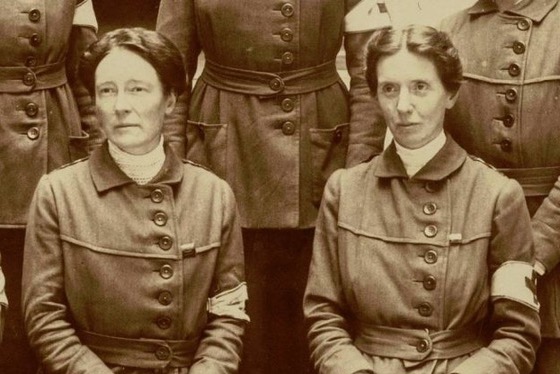- Screen Colours:
- Normal
- Black & Yellow

Louisa Garrett Anderson's Endell St Hospital
UPDATED ON 28th JUNE
—
Endell Street:
The Trailblazing Women who Ran World War One’s Most Remarkable Military Hospital
talk given by Wendy Moore on 20.06.22 via Zoom
Wendy started the talk, after being welcomed by our Chair Chris, by giving her working background as a journalist by training — concentrating on non-fiction medical and social history. She explained that her interest in the Endell Street Military Hospital began when she came across a painting of an operation which showed all the participating staff to be female. Enquiries revealed the history behind the hospital.
When World War One began in 1914, women doctors came forward with offers of help and were soon told by the British military hierarchy to “go home and sit still”.
Louisa Garrett Anderson and Flora Murray, both qualified doctors, suffragettes and life partners, did no such thing. When war broke out men signed up to fight and women worked in male roles. More than sixty female doctors volunteered but were rejected. Their qualifications were exactly the same as those of male doctors, but they were only permitted to treat women and children. There were one thousand women doctors at the outbreak of war. Louisa, a surgeon, and Flora, an anaesthetist, were keen to serve their country.
Eight days after the outbreak of war they offered help to the French Red Cross, raised money and in six weeks went to France, taking a team of female doctors and nurses. They formed the Woman’s Hospital Corps and were given an empty luxury hotel in Paris, brand new and had never been opened before. In forty-eight hours a 100-bed emergency hospital was set up, treating British and French direct from the frontline. The staff had no experience of military surgery and had not treated men before. The hospital was very successful, and a second military hospital set up in Wimereux became the first hospital to treat men under military conditions.
The British Army asked Louisa and Flora to set up a military hospital in the centre of London. The French units were closed and Endell Street Military Hospital (ESMH) was set up in May 1915 in a former workhouse, with 17 wards, 180 female staff and a few male orderlies. Members of the staff were given Army pay and allowances and Army ranks. ESMH was very close to Charing Cross station, where trains arrived full of the wounded. ESMH was featured in newspapers and magazines. In 1916 the hospital trialled an antiseptic ointment.
ESMH had a library, theatre, light airy wards with an open courtyard. The men did knitting and sewing. They suffered air raids and food shortages. Louisa and Flora were hard taskmasters. After the war ESMH stayed open treating Spanish flu victims, finally closing in December 1919. The female staff members were expected to go back to treating women and children again, or to go abroad to work.
Flora died in 1923 and Louisa died in 1943. An image of Dr Flora Murray appears on the back of the new £100 Bank of Scotland note. Wendy has been able to trace some family members of patients. The hospital records were destroyed after the war. ESMH was demolished and replaced by council flats in the 1970s.
Pat Carter
 |
 |
|
| Mardie Hodgson, Transport Officer | Louisa Garrett Anderson and Flora Murray |
When the First World War broke out in 1914 dozens of women doctors offered their services — but they were told by the British Army to “Go home and sit still”. Flora Murray and Louisa Garrett Anderson refused to sit still. Both qualified doctors and suffragettes — and also life partners — they took a team of women doctors and nurses to Paris. They ran a hospital there so successfully that the army invited them to open a second hospital in Boulogne and then — in May 1915 — to run a major military hospital in the heart of London. Endell Street was unique. It was the only hospital within the British Army to be staffed by women — all the doctors, nurses and orderlies were female apart from a dozen or so male helpers. The women of Endell Street treated 24,000 wounded soldiers who were shipped back from the frontline in France, Gallipoli and elsewhere throughout the war. After the war the hospital remained open to treat victims of the 1918 ‘Spanish’ flu pandemic. Endell Street became renowned as the ‘most popular’ hospital in the First World War — but that did nothing to help its women pioneers when peace came.
 |
 |
|
| Wendy Moore |
Wendy Moore, author of "ENDELL STREET: The Women who ran Britain’s Trailblazing Military Hospital", reveals the startling story of these pioneering women. Wendy is a freelance journalist and the author of five books on medical and social history. ENDELL STREET was a BBC Radio 4 Book of the Week.
Louisa Garrett Anderson was a daughter of Elizabeth Garrett Anderson, Mayor of Aldeburgh, who was the first female mayor in Britain, and the first woman to openly gain a medical qualification in Britain. The Garretts were major employers and philanthropists in our immediate area for some two centuries. Visit our «Garretts» page here.